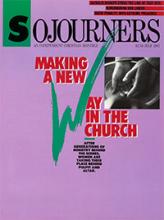I REMEMBER WALKING HOME FROM SCHOOL one day pestering the people I walked with, singing to them the liturgy from the Lutheran service book and hymnal. The tune and the words were special to me: "We praise thee, we bless thee, we worship thee, we glorify thee...." I found it hard to understand that the others weren't interested in hearing me sing God's praises. I was 9 years old and in the fourth grade.
I have always had a love affair with the church. From the moment my family first entered the doors of Bethel Lutheran Church in Chicago, I found the church a place that would always draw me in. It did not occur to me then that I might pursue ordained ministry; women were not yet being ordained in the Lutheran Church.
But when I was in junior high, I decided I wanted to become the first black woman ordained in the Lutheran Church. I soon decided, however, that being the first was not the right reason to become a minister. So I went to college and majored in education, then taught for five years.
After getting married and relocating to Washington, D.C., I began working as the community worker at a Lutheran church in Southwest D.C. My responsibilities were primarily in youth work and community outreach.
During the second summer I was there, the pastor went away for a few weeks and invited me to preach. As I stood in the pulpit and looked out into the congregation, all I could see was a very gracious and caring white-haired woman, smiling encouragingly up at me. My first thought was, "Deaf God, I don't want to shortchange her!"And suddenly I felt very calm. As I preached, I felt less nervous and very much at home. "This is my niche! This is where I belong!" I thought. The next week I went to Wesley Theological Seminary and registered for two classes.
Read the Full Article

